Pentecostalism has grown in India since its introduction in the early twentieth century. Several Pentecostal missionaries who had participated in the Azusa Street Revival visited Kerala from 1909 onwards. During the 1920s the missionary Robert F. Cook established the Indian branch of the Church of God, based in Kerala. In 1922 Assemblies of GOD church was established in Melpuram which was part of then Travancore state by missionaries. It has been one of the early pioneering churches in the region. Two other churches founded around this time were Ceylon Pentecostal Mission (CPM) later became The Pentecostal Mission, in the 1980s, founded in Sri Lanka by the Indian evangelist Pastor Paul, and later brought to India; and the Indian Pentecostal Church of God, set up by K.E. Abraham after he split from the church founded by Cook. A later foundation, in 1953, was the Sharon Fellowship, which runs the Sharon Women's Bible College.
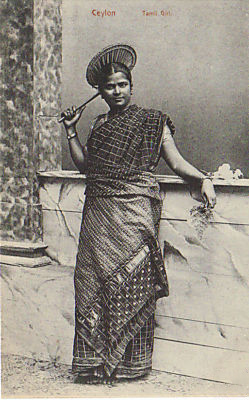
Sri Lankan Tamils, also known as Ceylon Tamils or Eelam Tamils, are Tamils native to the South Asian island state of Sri Lanka. Today, they constitute a majority in the Northern Province, form the plurality in the Eastern Province and are in the minority throughout the rest of the country. 70% of Sri Lankan Tamils in Sri Lanka live in the Northern and Eastern provinces.
Robert F. Cook (1880–1958) served as the prime missionary responsible for the establishment of the Pentecostal movement in India. Though a number of missionaries came before him and though the Pentecostal experience took place in India independent of foreign missionary work, Cook was the one that first established works that began to spread into neighboring areas. He came to India in October 1913. In 1914, he established a church in Thuvayoor, Kerala. However, three years later, on August 31, 1917, his wife, Anna, died. The following year, he met and married Bertha Frank.
Protestants in India are a minority and a sub-section of Christians in India and also to a certain extent the Christians in Pakistan before the Partition of India, that adhere to some or all of the doctrines of Protestantism. Protestants in India are a small minority in a predominantly Hindu majority country, but form majorities in the north-eastern states of Meghalaya, Mizoram and Nagaland and significant minorities in Konkan division, Bengal, Kerala and Tamil Nadu, with various communities in east coast and northern states. Protestants today trace their heritage back to the Protestant reformation of the 16th century. There are an estimated 20 million Protestants and 16 million Pentecostals in India.

Christianity is a minority religion in Sri Lanka. It was introduced to the island in first century. Traditionally, after Thomas the Apostle's visit in Kerala in AD 52, Christianity is said to have been introduced to Sri Lanka because of its close geographical and commercial ties.

According to the 2012 census, 6% of the population of Sri Lanka was Christian; of these, one in ten was Protestant, showing that there were approximately six Protestants for every 1,000 Sri Lankans. Later estimates suggest that this share has doubled in less than ten years.

The Theological College of Lanka (TCL) is an ecumenical college for Pastoral Formation ( seminary) that was inaugurated in 1963 by the Anglican Church, the Methodist Church and the Baptist Church in Sri Lanka. Later the Presbyterian Church joined the federation; Goals of the seminary being ministerial formation, education and empowering the new clergy (ministers) and laity in the environment and context of Sri Lanka and their own languages, Sinhala and Tamil. Graduates primarily serve the national churches in Sri Lanka and beyond. Rev. Basil Jackson, a British Methodist Missionary, became the founding Principal of the college in 1963.. It is believed that language is the vehicle of culture and when Christians begin to think, speak, preach, pray and write in their own languages, they soon become familiar with their cultural values and begin to appreciate them in the practice of their Christian faith. This new step was foreseen by all the churches as an attempt to produce indigenous theology and Sri Lankan Hermeneutics by people who are being educated in Sri Lanka.

The American Ceylon Mission (ACM) to Jaffna, Sri Lanka started with the arrival in 1813 of missionaries sponsored by the American Board of Commissioners for Foreign Missions (ABCFM). Although they had originally planned to work in Galle, the British colonial office in Ceylon restricted the Americans to out-of-the-way Jaffna due to the security concerns of the British who were warring with France at the time. The critical period of the impact of the missionaries was from the 1820s to early 20th century. During this time, they engaged in original translations from English to Tamil, printing, and publishing, establishing primary, secondary and tertiary educational institutions and providing health care for residents of the Jaffna Peninsula. These activities resulted in many social changes amongst Sri Lankan Tamils that survive even today. They also led to the attainment of a lopsided literacy level among residents in the relatively small peninsula that is cited by scholars as one of the primary factors contributing to the recently ended civil war. Many notable educational and health institutions within the Jaffna Peninsula owe their origins to the missionary activists from America. Missionaries also courted controversy by publishing negative information about local religious practices and rituals.
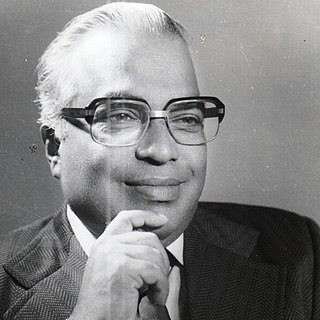
Kurien Thomas (1922–2000) or Kurian Thomas was a pioneer Christian missionary, pastor and religious teacher of the pentecostal missionary to Central India.

The Church of Ceylon is the Anglican Church in Sri Lanka. It is an extraprovincial jurisdiction of the Archbishop of Canterbury, who serves as its Metropolitan. It was established in 1845 with the appointment of the first Anglican Bishop of Colombo, James Chapman and until 1950 it consisted of a single diocese; in that year a second diocese was established at Kurunegala.

Paulaseer Lawrie Muthukrishna ; was an Indian preacher who had followers worldwide. He is known for his faith-healing movement and initiated the "One God, One Nation movement" in India. He was a follower and promoter of the teachings of William Branham.

Mannar District is one of the 25 districts of Sri Lanka, the second level administrative division of the country. The district is administered by a District Secretariat headed by a District Secretary appointed by the central government of Sri Lanka. The capital of the district is Mannar, which is located on Mannar Island.

Christianity in the state of Tamil Nadu, India is the second largest religion in the state. According to tradition, St. Thomas, one of the twelve apostles, landed in Malabar Coast in AD 52. In the colonial age many Portuguese, Dutch, British and Italian Christians came to Tamil Nadu. Priests accompanied them not only to minister the colonisers but also to spread the Christian faith among the non-Christians in Tamil Nadu. Currently, Christians are a minority community comprising 6% of the total population. Christians are mainly concentrated in the southern districts of Tamil Nadu - Kanyakumari, Thoothukudi and Tirunelveli.
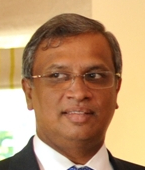
Mathiaparanan Abraham Sumanthiran, MP, PC born 9 February 1964) is a Sri Lankan Tamil lawyer and politician. A successful civil lawyer who practices civil litigation, human rights and constitutional law; Sumanthiran has severed as Member of Parliament from the Jaffna District since 2015 and National List from the 2010 to 2015 from the Illankai Tamil Arasu Kachchi.
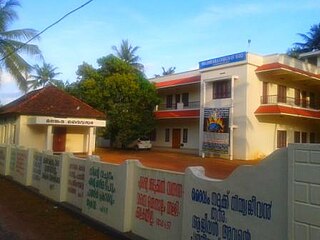
Malankara Church of God Thrikkannamangal is a church in Kottarakkara, Kerala, India, originally known as Malankara Poorna Suvisesha Sabha.
Attacks on Sri Lankans in Tamil Nadu refer to a series of attacks and demonstrations that have taken place in the Indian state of Tamil Nadu against Sri Lankans and Sri Lankan interests in the state. The protests took several forms, of attacks on individuals, groups and institutions.
The Methodist Church of Sri Lanka is a Protestant Christian denomination in Sri Lanka. Its headquarters is in Colombo and was established on 29 June 1814. It is a member of the World Council of Churches, the Christian Conference of Asia, the National Christian Council of Sri Lanka and the World Methodist Council.
Pentecostalism is a renewal movement within Protestant Christianity that places special emphasis on a direct personal relationship with God and experience of God through the baptism with the Holy Spirit. For Christians, this event commemorates the descent of the Holy Spirit upon the followers of Jesus Christ, as described in the second chapter of the Book of Acts. Pentecostalism was established in Kerala, India at the start of the 20th century.
Sister Sarah Navaroji was a South Indian evangelical preacher and the founder of the Zion Gospel Prayer Fellowship Church. She was one of the few influential women Christian leaders of South Indian Pentecostalism.
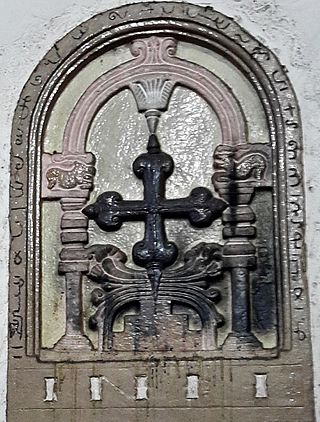
Pentecostal Saint Thomas Christians, also called Pentecostal Syrian Christians, are the ethnic Saint Thomas Christians (Nasranis) affiliated to various Pentecostal and independent Neo-Charismatic churches. Sometimes, the Kerala Brethren are also erroneously lumped together with Pentecostals. The community is native to the Indian state of Kerala, and shares in the legacy of early Christianity in the region, traditionally traced to the missionary activities of Saint Thomas the Apostle in the first century. Prior to their conversion to Pentecostalism, they belonged to traditional Saint Thomas Christian denominations.












